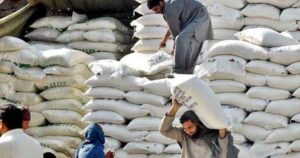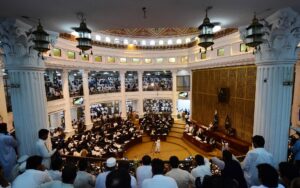PESHAWAR – The flour shortage in Pakistan drives a political and economic storm as Punjab restricts wheat movement and pushes prices higher in Khyber Pakhtunkhwa and Sindh. Punjab officials defend the move as a market “stabilisation measure,” but leaders in other provinces call it a de facto wheat ban that fuels mistrust and undermines federalism.
Punjab authorities set up check posts and barriers to block wheat trucks from crossing provincial borders. These actions choke supply lines to the smaller provinces. Flour mill owners, who rely on Punjab’s wheat reserves, argue that the restrictions violate Article 151 of the Constitution, which guarantees free inter-provincial trade. Politicians in Peshawar and Karachi accuse Punjab of protecting its own market at the cost of national unity.
Lawmakers in Khyber Pakhtunkhwa immediately passed a resolution that condemned Punjab’s decision, while Governor Faisal Karim Kundi declared the restrictions a “serious breach of national cohesion.” Sindh leaders joined the criticism and warned that Punjab’s policy could harden into a political fault line.
Provinces have imposed similar restrictions before. In 2020, 2022, and 2023, wheat shortages forced local governments to block inter-provincial flows. Punjab, as the country’s largest buyer with more than 4mn tonnes of procurement each year, holds decisive power over the national market. This year Punjab tightened its grip even further, and in doing so, it deepened market fragility instead of reducing it.
Flour prices inside Punjab also climbed despite the ban. Traders say hoarders exploited the restrictions, while businesses lost confidence. Investors who financed wheat purchases on the government’s earlier promises now feel betrayed by sudden state intervention.
Pakistan Needs A Long-Term Wheat Policy
The flour shortage in Pakistan exposes the half-baked reforms that dominate wheat policy. Officials tried to curb speculative trade but failed to protect provinces that depend on Punjab’s stocks. This failure gave profiteers an opportunity to manipulate prices. Smaller provinces now carry the heaviest burden of Punjab’s unilateral actions.
The crisis proves that Pakistan cannot rely on ad hoc bans. A sustainable wheat market demands a long-term national framework. Such a policy must protect consumers, block hoarding networks, and secure private investment in procurement and storage.
Without that framework, the flour shortage in Pakistan will keep resurfacing, not because of genuine supply gaps but because of political fault lines. Provincial rivalries will continue to shape food security, and the spirit of federalism will suffer further blows.












